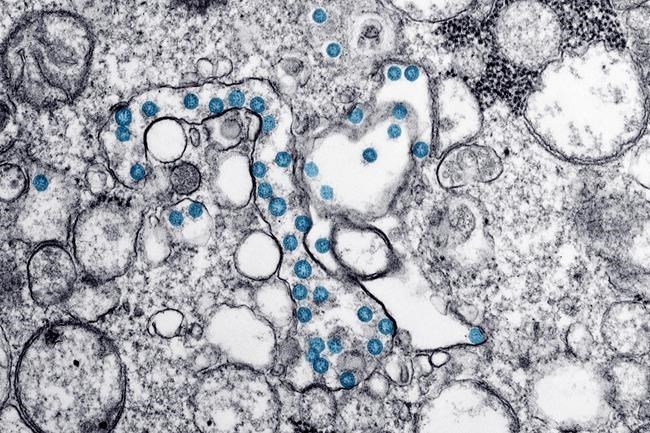
This 2020 electron microscope image made available by the U.S. Centers for Disease Control and Prevention shows the spherical particles of the new coronavirus, colorized blue, from the first U.S. case of COVID-19. The Canadian Association of Emergency Physicians is calling on its doctors to protect the limited supply of certain sedatives and pain killers needed to ventilate patients. THE CANADIAN PRESS/Hannah A. Bullock, Azaibi Tamin/CDC via AP
April 22, 2020 - 1:00 AM
Thousands of scientists around the world are working on problems raised by the COVID-19 pandemic. Here is a summary of some recent research from peer-reviewed academic journals and scientific agencies:
---
Research in the journal Cell is casting doubt on the use of antiviral drugs developed for use against HIV in the fight against the novel coronavirus. A paper incorporating control-group protocols has found that neither lopinavir/ritonavir or arbidol improved the clinical outcome of patients hospitalized with mild-to-moderate cases of COVID-19. The study assessed 86 patients with mild-to-moderate COVID-19. Lopinavir/ritonavir was given to 34, Arbidol to 35 and 17 received no antiviral medication. All three groups showed similar outcomes at seven and 14 days.
---
As governments debate reopening their economies, an analysis from the Vienna University of Economics and Business, the Austrian Institute of Economic Research and that country's Institute for Advanced Studies has concluded the consequences of the lockdown and partial suspension of global trade flows will be felt for a long time. If the shutdown remains in place until mid-May, researchers predict the country's economy won't fully recover until 2022. They say those effects will be particularly pronounced for small open economies with highly developed manufacturing and service sectors and complex international and domestic economic relations.
---
An agency based at the University of Alberta is helping develop and validate a simple blood test to predict the severity of COVID-19 in patients. The Canadian BioSample Repository will collect blood samples and the university's spinoff company Nanostics will measure the viral load of each. The resulting blood test will use machine learning algorithms to determine how badly each patient is likely to suffer with COVID-19, useful information for doctors determining how to treat them.
---
The Canadian Paediatric Society has launched a study to learn how many children are becoming seriously ill from COVID-19. It is to collect data from 2,800 paediatricians across the country, the largest COVID-19 public health surveillance study in Canada. The society says little is known on how the virus affects children, especially those with pre-existing conditions. The results will also be compared internationally.
---
Peer-reviewed research suggests that two anti-malarial drugs sometimes touted as effective against the novel coronavirus may do more harm than good. In the journal Microbes and Infection, scientists report that while chloroquine and hydroxychloroquine may reduce virus counts in the lab, they can actually increase them in living organisms. The paper points to other studies finding the drugs had little impact on viruses when used in animal trials. In some cases, they actually increased the speed at which the viruses replicated. The authors recommend "extreme caution" in suggesting the two drugs could work against COVID-19.
---
A study in the journal Administrative Theory and Praxis proposes that the COVID-19 pandemic could have a measurable impact on the upcoming fall election in the United States. Given that older voters tend to be both Republican and more vulnerable to COVID-19, the authors suggest the disease could affect swing-state voting results. They write that if Pennsylvania continues to use only social distancing to combat COVID-19, it could lose over 13,000 more Republicans than Democrats older than 65. Cumulatively, in all ages, 14,551 more Republicans than Democrats would perish under these projections, a significant change given that President Donald Trump carried the state by 44,292 votes in the last election.
---
This report by The Canadian Press was first published April 22, 2020
News from © The Canadian Press, 2020